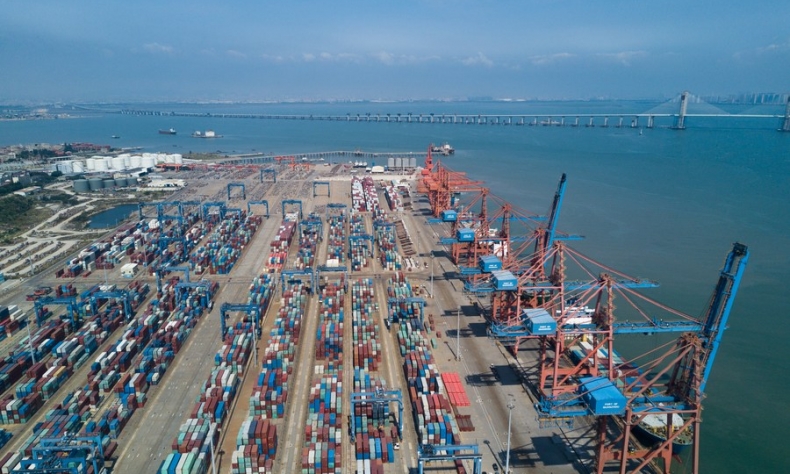Surge in China’s Exports Shows Its Importance to Global Economy

U.S. policymakers should recognize that the concept of “decoupling” from China ultimately lacks feasibility and is expensive, and will only serve to isolate America in the long run.
News emerged this week that China’s exports had surged by the highest monthly amount since December 2018, fuelled by a surge in demand for medical related supplies as the global COVID-19 pandemic continues to take its toll.
Chinese firms shipped $268 billion over the past month, 21% higher than the same period in 2019. This resulted in the country’s trade surplus surging to $75.4 billion, the largest total since 1990. The news is hardly a surprise given that China’s economy has long since returned to growth and rebounded quickly from early COVID-19 setbacks.
This will result in it being one of the only major economies in the world to end the year with positive GDP growth.
Such data ultimately shows the resilience and importance of China’s supply chains. It comes despite a tidal wave of anti-China sentiment over the past year seeking to scapegoat the country for starting the global pandemic, and subsequently promoting an argument for “decoupling” – the idea that Western countries should reduce their independence on China, and thus subsequently attempting to “repatriate” manufacturing back home or going elsewhere.
Chief among the advocates of such, of course, has been the Trump administration, which has sought to aggressively promote a Cold War-style confrontation against Beijing. Yet, even exports to the United States have increased despite the tariffs Trump has imposed.
What does this development tell us? It shows that China remains pivotal to the global economy, and will remain an industrial and manufacturing powerhouse central to and deeply integrated in the global commerce and supply chains.
With China’s level of infrastructure, workforce, connectivity and cost competitiveness, it is unrealistic to assume this can feasibly change in the short-term. Even if Trump’s trade war has been somewhat detrimental, it has ultimately not been a game changer to China’s economy. Given this, policymakers especially in the United States should stop attempting to envision an unrealistic scenario that economic ties between Washington and Beijing can be discounted.
In espousing a vision of “decoupling,” Washington’s Cold War enthusiasts look back towards America’s struggle with the Soviet Union in the latter half of the 20th century, whereby the world was largely divided into two distinct ideological blocs and were for the most part, economically separate from one another.
With the Western bloc having little trade or financial relations with the Soviet Union, the norm of “interdependence” – whereby countries mutually rely on ties with each other to uphold their prosperity and wellbeing, did not really apply.
What attracts anti-China hawks to nostalgia is that such a layout of the global economy allowed the United States to pursue “strategic competition” against the Soviet Union without facing any kind of consequences or economic repercussions against itself. Therefore, it is argued if the United States “decouples” from China and isolates it from its own sphere of influence, it can more confidently assert its interests against Beijing in a Cold War manner and “contain” China without restraint. Thus, the call is continually made to reduce economic, trade and investment ties with Beijing.
However, what these individuals fail to take into account is that the world has changed, and China is not the Soviet Union. Instead, it is a global manufacturing and industrial powerhouse deeply embedded into international business and commerce.
Moreover, it is the largest trading partner of numerous countries spanning every continent, as well as a leading investor and lender. In the midst of American aggression, it has sought to entrench this position by expanding its role in free trade agreements around the world.
This is apart from China’s own domestic market of 1.4 billion being the largest on Earth. The size of its labor force coupled with the size of its own demand subsequently means that profit margins are higher, and therefore the cost of production and sale of goods is naturally cheaper than anywhere else on Earth. This isn’t a “conspiracy” by the Communist Party of China to steal American jobs as the Trump administration claims, but a simple product of economics.
China’s export data makes it very clear that it remains pivotal in global industry and manufacturing. Its role in supply chains has proved to be very important in schemes such as the Belt and Road Initiative.
For example, the COVID-19 pandemic has seen the Europe-China freight railway has flourished as shipping and air cargo were rendered less reliable, with November having seen over 11,000 trains span the continent. Given this, U.S. policymakers should recognize that the concept of “decoupling” from China ultimately lacks feasibility and is expensive, and will only serve to isolate America in the long run.
 Facebook
Facebook
 Twitter
Twitter
 Linkedin
Linkedin
 Google +
Google +







